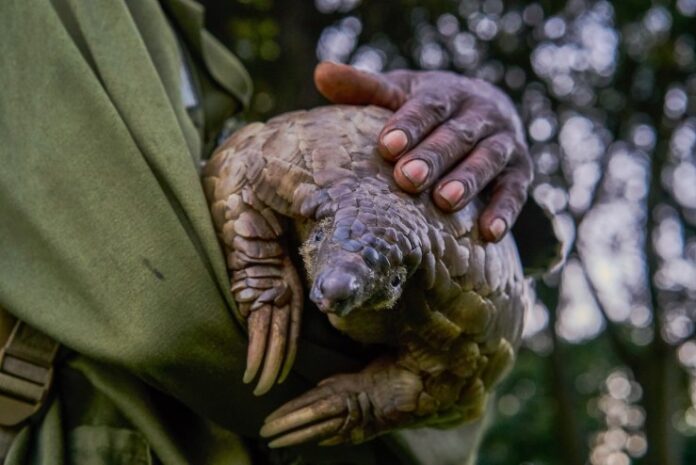By Laida K. Chongo
The illegal trade of pangolins—poaching, trafficking, and sale of pangolins, their parts, or pangolin-derived products on the black market—is thriving. According to the International Union for Conservation of Nature (ICUN), pangolins are believed to be the world’s most trafficked mammal, accounting for as much as 20% of all illegal wildlife trade. In the decade leading up to 2014, more than a million pangolins were poached.
From 2013 to 2019, the scales of tens of thousands of pangolins were seized in the Hong Kong Special Administrative Region of China alone, mostly from Africa. Based on these seizures, it’s estimated that a pangolin is poached every 17 minutes to supply the city’s illegal pangolin trade. Experts believe that the eight species will be extinct within 10-20 years if the current situation continues. This information is according to the Pangolin Reports.
In two record-breaking seizures within a week in April 2019, Singapore confiscated a 14.2-ton shipment and a 14-ton shipment of pangolin scales—from an estimated 72,000 pangolins—originating from Nigeria.
In Asia, pangolin meat is considered a delicacy, and their scales are used in traditional medicine, fetching huge sums on the black market. The US is another key market, with American customs officials seizing 30,000 illegally imported pangolins between 2005 and 2014 alone.
There are eight species of pangolins in the world, with four species in Asia and another four in Africa.
The four species of African pangolin are dispersed throughout southern, western, central, and eastern Africa. An estimated 8.5 million pangolins were removed from the wild in west and central Africa for the illegal trade between 2014 and 2021.
Zambia is home to two of Africa’s four pangolin species: the white-bellied or tree pangolin (Phataginus tricuspis) and the Temminck’s or ground pangolin (Smutsia temminckii).
In Africa, it is alleged that many people use pangolins as treatment for various illnesses.
Light at the end of the tunnel
Dr. Suwilanji Sichone, who manages the Pangolin Rehabilitation Unit in Zambia, observed that pangolins have historically received little conservation attention. This changed with the initiation of the Protect the Pangolin project in 2018, following a series of live pangolin seizures in Zambia.
ADVERTISEMENT
She explained that law enforcement officers initially didn’t know how to care for seized pangolins, which were often found in a weakened state. As a result, a rehabilitation unit was eventually established to look after them until they were fit enough to be released back into the wild.
When asked if conversations about protecting pangolins by the government and stakeholders are yielding results, Dr. Sichone narrated that public awareness about pangolins has increased. People are becoming more respectful and leaving them alone, especially since pangolins are solitary animals that live far from human habitations.
She added that seized pangolins are now receiving better treatment, as officers have gained knowledge on how to handle them. This means that by the time the pangolins reach the rehabilitation facility, they have been preserved and looked after properly, resulting in a higher chance of survival.
Dr. Jackson Katampi, a Wildlife Conservationist, lamented that cases of trafficking Pangolins in Zambia are quite rampant and we have hotspot areas that are urban driven such as Lusaka, Solwezi and Katete.
“What influences the trafficking of Pangolins is mostly the false information going round about how expensive Pangolins are, the traffickers believe that the animal costs thousands, so even when they find it in their fields, some don’t even know what to do with it but because of this information, they keep it and look for buyers which often lands them behind bars and there also some cases where traditional healers use it for charms,” he explained.
He continued to say that no rich person has been found in Zambia as a result of selling pangolins, so there is need to demystify some myths about the animal.
The African problem
In Nigerian Yorubic traditional medicine, pangolins are believed to enable invisibility and are used to treat 42 conditions, including infertility, stomach ulcers, and removing bad luck.
A study involving 48 traditional healers in Kumasi, Ghana, revealed that 13 pangolin body parts are used to treat various ailments. The most commonly prescribed parts are scales and bones, which hold significant cultural importance for treating spiritual protection, rheumatism, financial rituals, and convulsions.
Despite being classified under Schedule 1 of Ghana’s Wildlife Conservation Act of 1971 (LI 685), which prohibits hunting or possessing pangolins, the use of pangolins in traditional medicine remains widespread. This information is according to a research article published by Plos One.
Godfrey Sichali in Chinsali, Zambia, who served for over two decades as park ranger, explained that pangolin scales are made of keratin, like human fingernails, and can regrow when cut. This has fuelled myths and driven the economic trade in pangolins.
The sentiments expressed by Mr. Sichali align with the findings from traditional medicine studies in Ghana.
“There are strong myths that people have believed for a long time. For instance, some believe that with a live pangolin and a good witch doctor, the witch doctor can use the pangolin to multiply money, leading to high demand for the animal,” he said.
Mr. Sichali highlighted that the government has placed strict measures to protect pangolins because they are close to extinction. He warned traffickers that using pangolins to ‘blast’ or multiply money, a practice known as the black dollar, is a myth that will only result in imprisonment without any economic gain. Pangolins are estimated to cost about $600 per kilogramme on the black market.
When asked about the major buyers of trafficked pangolins, Mr. Sichali said that from interactions with caught traffickers, it was established that Chinese nationals are the primary buyers.
In Nigerian, the problem is worsening
In Nigeria, in 2022, customs officials seized 1,613 tons of pangolin scales and arrested 14 people. Additionally, in October 2023, Nigeria publicly burned four tons of seized pangolin scales valued at US$1.4 million, marking the first such public destruction aimed at discouraging illegal trafficking.
Dr. Mark Ofua, a veterinarian, wildlife conservationist, and Nigeria country representative for the Wild Africa Fund observed that the true extent of pangolin trafficking in Nigeria exceeds documented statistics. He said hunters and bushmeat sellers primarily gather pangolins for their scales, driven by lucrative offers from Chinese buyers.
Hunters and bushmeat sellers primarily gather pangolins for their scales, driven by lucrative offers from Chinese buyers
“With the influx of Chinese buyers, the trade dynamics have dramatically worsened. Initially sought for their flesh, pangolin scales were discarded until Chinese buyers started offering substantial sums. Now, there’s intense focus on collecting and selling scales,” Dr. Ofua explained.
In a significant incident in 2016, Chinese customs conducted their largest-ever seizure of pangolin scales, confiscating 3.1 tons from smugglers. According to Chinese state media, these scales were concealed in a container labelled as timber arriving from Africa. Customs officers discovered the scales—equivalent to about 7,500 pangolins—packed in 101 woven plastic bags hidden aboard the ship, valued at over $2 million on the black market.
Dr. Ofua noted the challenge of monitoring large-scale trafficking, as Chinese buyers are now involved in local industries like logging and construction, facilitating covert scale transactions. Dr. Ofua emphasized that many pangolin scales trafficked in Nigeria originate from neighbouring states like Cameroon, Chad, Niger, and Benin Republic.
Traffickers exploit porous borders and limited surveillance technology, evading detection
“Traffickers exploit porous borders and limited surveillance technology, evading detection. The smuggling of pangolin scales is rampant, and we’re only scratching the surface of its magnitude,” he added.
Dr. Ofua highlighted the complicity of some traditional rulers in facilitating scale movements in northern states, despite efforts by Nigerian customs and organisations like the Wild Africa Fund to enhance enforcement with sniffer dogs. He emphasised that poverty is often cited as an excuse by traffickers caught with pangolins, but he views this as a cover for greed, not necessity.
A call for action
Maina Malaya, a Communications Officer at Wildlife Crime Prevention and part of the Protect the Pangolin Project, emphasised that enhancing law enforcement capabilities is crucial. She said this includes providing comprehensive training in anti-poaching techniques and equipping them with essential resources such as patrol vehicles, drones, and improved communication systems.
Malaya asserts that these measures can significantly boost effectiveness in detecting, apprehending poachers, and swiftly delivering pangolins to rescue centers. Additionally, she stresses the importance of fostering stronger collaboration between Zambia’s Department of National Parks and Wildlife (DNPW), other law enforcement agencies, and customs officials. Improved information sharing and coordinated efforts are essential for effectively disrupting trafficking networks.
However, the situation in Zambia is further complicated by instances of law enforcement officers involved in illegal pangolin trade. For instance, in July 2018, the Lusaka Subordinate Court sentenced a Wildlife Police Officer from the Department of National Parks and Wildlife and an Officer from the Zambia Police Service to five years imprisonment with hard labour for unlawful possession of a live pangolin.
Laida K. Chongo is a fellow under the Wildlife Crime Prevention (WCP) fellowship for journalists. The MakanDay Centre for Investigative Journalism, in partnership with WCP, provided training in investigative journalism skills and supported journalists in working on impactful stories that promote environmental protection and drive change.

Discover more from MAKANDAY
Subscribe to get the latest posts sent to your email.



